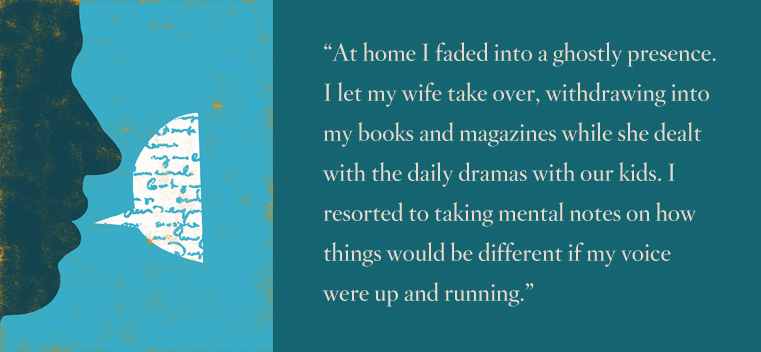
Voice, Interrupted
Josh Charlson (G93, 98), a senior analyst and editor at Morningstar, lives in Deerfield, Ill., with his wife and children.
Tell us what you think. E-mail comments or questions to the editors at letters@northwestern.edu.
Ever wonder about those strange designations we use throughout Northwestern to identify alumni of the various schools of the University? See the complete list.
Find Us on Social Media
Following surgery, an editor finds himself at a loss for spoken words.
When my cancer re-emerged from hibernation for the third time in two decades, I thought I was as prepared as anyone could be for the news that a tumor was growing inside me. Having endured chemo and multiple invasive surgeries in the past, I knew that the treatments were grueling but tolerable. I started working out like a maniac to speed my eventual recovery. I expected disruptions to schedules and emotions, particularly for our kids, ages 10 and 13. The last time around, 10 years prior, they’d been a blissfully ignorant newborn and toddler.
What I did not expect was to lose my voice.
What started out as a rare recurrence of testicular cancer had lodged itself in my neck, just above my left clavicle, amid a thicket of crucial nerves, arteries, ducts and glands. It was, as one surgeon understatedly noted, a “tricky spot.”
During surgery my doctors excised the cancer but injured the delicate vagus nerve, which branches out to the vocal chords. When I awoke, I had a fresh scar running from the left edge of my neck to the base of my sternum. And a voice that was no longer my own.
With a paralyzed left vocal chord, my once-pleasant tenor voice was reduced to a rasp just above a whisper. In close quarters or quiet rooms I could, with some effort, lean close and communicate. But if I tried to speak in a crowded room or call for my wife across my house or cheer my kids on at baseball and soccer games, my voice was useless.
I soon found that living my everyday life without a functioning voice weighed on me in unpredictable ways. I often felt disconnected, at a remove from the people and world around me.
I got a taste of this the first time we returned as a family to our synagogue, where I often chant from the Torah. But as I opened my lips to join with the congregation in prayer, I found that I could produce only a scratchy exhalation; I felt strangely alone in the crowd.
At home I faded into a ghostly presence. Normally an involved parent, I let my wife take over, withdrawing into my books and magazines while she dealt with the daily dramas with our kids. I resorted to taking mental notes on how things would be different if my voice were up and running.
There are limits to how far silence can go as a parenting strategy. My wife made that clear when she confronted me after a few weeks of my hanging around the house:
“Why are you so angry with me?” She was holding back tears.
“What do you mean?” I was truly puzzled.
“You’re sullen, withdrawn. You never express yourself. And then all you do is scowl at everything I do or say. I can’t take it any more!”
Her words were a swift punch to my gut. Clearly I had some self-reckoning to do. I was letting my voice loss keep me apart — from my family, from whatever fears my recurrence threatened to unleash. That wasn’t what my wife and kids needed, though. They needed my presence, voice or no voice.
Several weeks later I ventured out to my son’s baseball game. Normally a sure-handed center fielder, he mishandled two playable fly balls that evening, contributing to a tough one-run loss.
My son, always hard on himself, was downcast on the drive home. He’s entered into teenagehood and doesn’t say a whole lot to us these days, but I knew he must be unsettled, even scared, by my surgery and the strangeness of my voice. Here in the enclosed space of the car he’d be able to hear me, and in my mind I sorted through the right fatherly words. It’s just a game. Did you lose it in the sun? Your team had plenty of opportunities to win. But every phrase sounded trite, or worse, like an excuse.
Then my son surprised me.
“Dad,” he said.
“Yes?” I was ready to hear him pronounce that he was quitting baseball.
“Thanks for coming. Too bad we lost.”
It was his way of telling me that I didn’t need to find the perfect words, so instead I smiled and clasped his forearm.
Our conversation ended there, as my son switched on the radio to one of his pop stations. But the tension in the car had dissipated, and a certain calm rolled over me. Voiceless though I might be — and however long it might take to get my voice back — I knew now that I could still find a way to make myself heard.



 Facebook
Facebook Twitter
Twitter Email
Email


